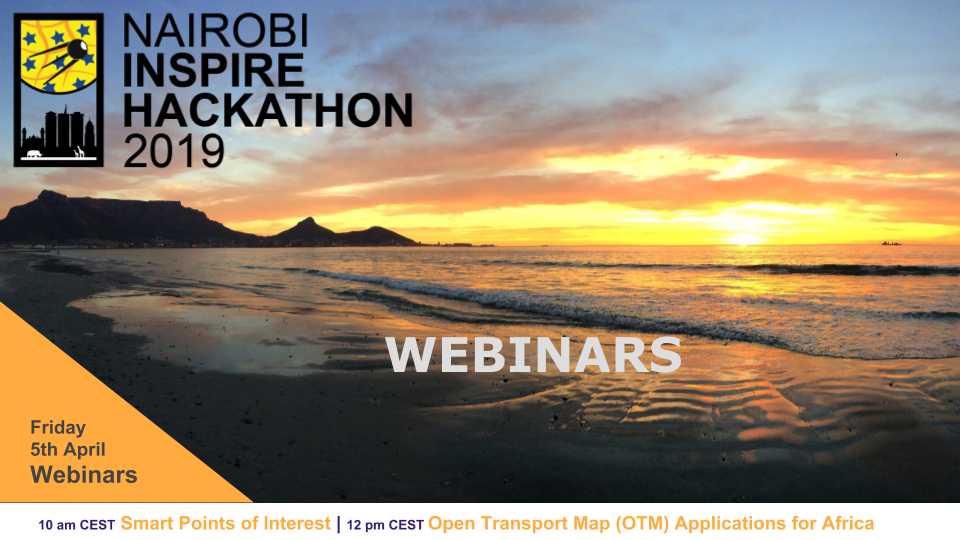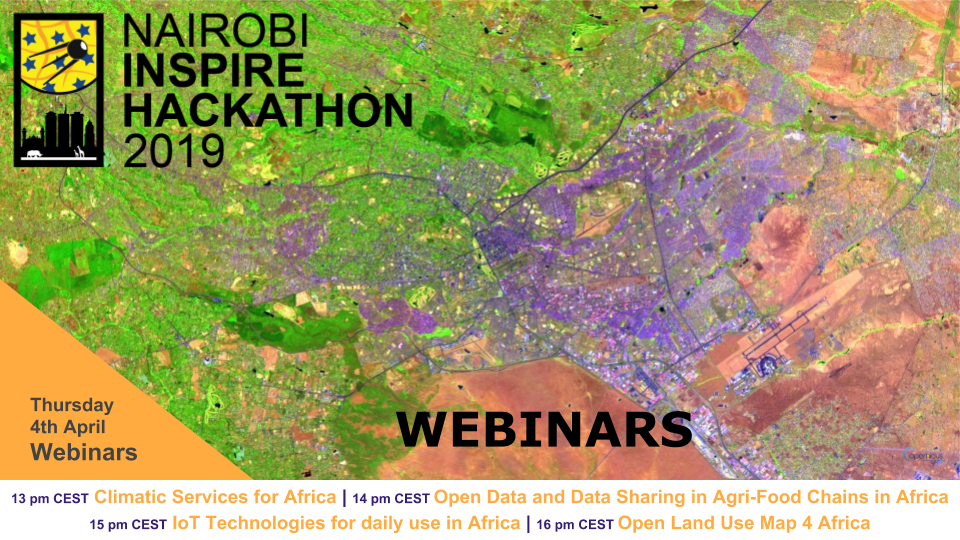Last 3 webinars dedicated to 3 teams from the Nairobi INSPIRE Hackathon 2019. These webinars are scheduled for Monday 8th April 2019 and below you can find the overview and more details.
| Monday 8 April | 2pm | Team 5 | Webinar URL | Karel Charvat |
| Monday 8 April | 3pm | Team 1 | Webinar URL | Karel Charvat |
| Monday 8 April | 4pm | Team 8 | Webinar URL | Uta Wehn |
Agriculture Innovation Hub for Africa
Monday 8th April, 14:00 CEST
What is it about:
The African region is in a process of transformation and an agriculture innovation hub is a potential solution that can support sustainable intensification in agriculture in Africa. An innovation Hub is a place, where people can meet and share their knowledge. It is mainly about people and we need to build a community that are be able share knowledge. In this webinar there will be a discussion about how to build a social space – an innovation hub for agriculture, how to develop and collect relevant content, and finally, but perhaps the most important; how to attract people. The starting point will be to discuss how to transfer experience from the European SmartAgriHub project to build an equivalent tailored solution for Africa.
Who is it for:
People from Universities, Research Organisation, scientific centres, agriculture food industry, farmers, forest owners, and IT developers.
What Earth observations could do for African farmers
Monday 8th April, 15:00 CEST
What is it about:
In this webinar we will discuss how Earth observation can support food security in Africa.
Since new Earth observation technologies are being developed and we see a continuedl growing population on global scale, it is necessary to solve problems related to a sustainable intensification of the farming sector in Africa.
The main question we address in this webinar is if African farmers can directly benefit from Earth Observation. A view to how this impact different level of decisions has to be included.
Governments, industry, researchers, all actors along the food chain, need to be involved to support uptake of Earth observations in the African farming sector.
Who is it for:
People, who are interested in using Earth Observation Data for Agriculture, mainly in context of Africa
People dealing with GEOSS or Copernicus for African activities, providers of Satellite data, people with experiences with utilisation of Earth observation in African Agriculture. Participants in the Nairobi INSPIRE hackathon.
Citizen Science in Africa to ground truth & exploit Earth Observation data – from challenge to fundable ideas.
Monday 8th April, 16:00 CEST
Register here
What is it about:
Africa is arguably most in need of innovative solutions to address challenges related to climate change, water management, land use, population growth etc. In principle, there is great potential for citizen scientists – or the wider public – to validate what satellites observe or to put those images to use. The combination of Citizen Science and Earth Observation can provide powerful new data, insights, knowledge and understanding to identify and manage these challenges at various scales. In practice, the implementation of such ideas is faced by social, scientific, technical and economic challenges. This webinar kick starts Theme 8 of the Nairobi INSPIRE HACKATHON, explore these challenges and start brainstorming in order to develop fundable ideas.
Who is it for:
CSOs, Earth observation focused SMEs, research and academia, young professionals & Citizen Science enthusiasts, Earth Observation specialists, thematic experts (e.g. water security, food security, health, ecosystem.
In principle, there is great potential for citizen scientists – or the wider public – to validate what satellites observe or to put those images to use. In practice, the implementation of such ideas is faced by social, scientific, technical and economic challenges.


